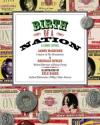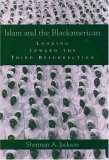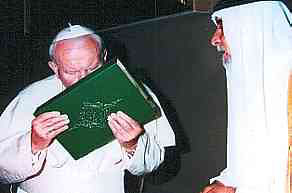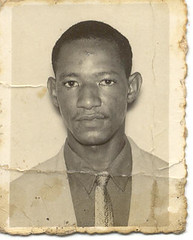Given the date and the background concept for this blog I feel obliged to touch on the following topic:
Often around April 1st, some version of the following story circulates among Muslims on the internet. (Here's the one I got this year)
APRIL FOOL
Most of us celebrate April fool day every year and fool each other. But how many of us know the bitter facts hidden behind it. It was around a thousand years ago that Spain was ruled by Muslims. And the Muslim power in Spain was so strong that it couldn't be destroyed. The Christians of the west wished to wipe out Islam from all parts of the world and they did succeed to quite an extent. But when they tried to eliminate Islam in Spain and conquer it, they failed. They tried several times but never succeeded. The unbelievers then sent their spies in Spain to study the Muslims there and find out what was the power they possessed and they found that their power was TAQWA . The Muslims of Spain were not just Muslims but they were practicing Muslims. They not only read the Quran but also acted upon it. When the Christians found the power of the Muslims they started thinking of strategies to break this power. So they started sending alcohol and cigarettes to Spain free of cost. This technique of the west worked out and it started weakening the faith of the Muslims in particular the young generation of Spain.
The result was that the Catholics of the west wiped out Islam and conquered the entire Spain bringing an end to the EIGHT HUNDRED LONG YEARS' RULE OF THE MUSLIMS in Spain. The last fort of the Muslims to fall was Grenada (Gharnatah), which was on the 1st of April. From that year onwards, every year they celebrate April fools day on the 1st of April, celebrating the day, they made a fool of the Muslims. They did not make a fool of the Muslim army at Gharnatah only, but of the whole Muslim Ummah.
We, the Muslims, were fooled by the unbelievers. They have a reason to celebrate April fool day, to keep up the spirit. Dear brothers and sisters, when we join in this celebration, we do so out of ignorance. If we had known about it, we would never have celebrated our own downfall. So now, that we are aware of it, and now let us promise that we shall never celebrate this day. We should learn our lesson from the people of Spain, and shall try to become practicing Muslims, never to let anybody weaken our faith.
Please forward this message to as many people you know. The more people you forward it to the greater will be the reward from your Lord in this world and the hereafter. Please try to do it before the 1st of April, to create awareness that WE ARE NOT FOOLS ANYMORE.
The funny thing about this story is that it is actually totally FALSE. One site where the story is debunked is
here. And so in some weird post-modern way, the e-mail itself becomes an example of an April Fool's day prank being perpetrated on Muslims by Muslims.
I hate to say it but sometimes I get the feeling that as a group, Muslims need to develop a lot more critical-thinking and need to learn not to pass on everything we hear from so-and-so as the truth. As the saying goes: If a person repeats whatever he or she hears, that is sufficient for them to be considered a liar.
And there are some pretty spectacular examples of our (Muslims) capacity to pass on whatever we hear... except like a huge game of Telephone, the transmission isn't always perfectly clear.
One of my favorite examples is the story of how Neil Armstrong became Muslim. (He's not actually Muslim, at least not in the normal sense. And he and his press agents have had to go through a certain amount of effort to debunk that particular rumor.) Apparently what happened was that in an interview once, Neil Armstrong was commenting on the adhan (the Muslim call to prayer) and remarked that it sounded "spacey" and somehow that got morphed into a nice (actually quite beautiful) story of how when he was up in space he heard this strange music he didn't recognize. And then much later, he happened to be visiting Cairo and again heard the same strange sounds, and he tracked the sound down and realized it was the adhan. And he was so inspired by the miracle that he was moved to become Muslim.
It is understandable that occasionally, honest mistakes get passed on and errors would get propagated. But the fact that many of these stories are repeatedly told and pervasively re-appear even after being debunked suggests that these aren't just simple mistakes, but that the stories get repeated because they fill some kind of need.
The Neil Armstrong story is just one of a genre (the false conversion story). Another similar account is the Jacques Cousteau conversion story. This one centers on the Quranic passage: "He has let free the two bodies of flowing water, meeting together: Between them is a barrier which they do not transgress." (55:19-20) which is taken to refer to some specific natural phenomena. And the claim is that Jacques Cousteau recognized this special phenomena as real and was so impressed by the Quran's scientific accuracy that he converted. Both accounts are similar in that they involve white Westerners in scientific fields.
Issues around science and technology, I think, hit a real nerve with some Muslims. Many Islamic apologetical books, articles and websites place a very strong emphasis on the presence of scientific content in the Quran. (For example,
The Bible, Quran and Science by Dr. Maurice Bucaille) Such an approach is fine if it strengthens people's faith but personally, I feel that some people emphasize it out of proportion to its actual importance. The Quran is the word of God, so if the Quran talks about scientific matters we'd expect it to speak the truth, and it does, but I'm not sure that the early Muslims made all of the great sacrifices they made, just to give us a science textbook. The Quran, is primarily a source of guidance for how to live our lives, morally, ethically, spiritually, and its main function isn't to explain fetal development or planetary orbits.
I suspect that one reason why Muslims, especially non-Western Muslims really gravitate towards the scientific miracle approach to Islam is that in the wake of Western colonialism, the Muslim (i.e. non-Western developing) world lags behind the West technologically. In some contexts being Western is strongly overlaps with being scientific (mira', que los blancos inventan.) And given the dissonance of that situation, Muslims can gain some measure of comfort by thinking that in spite of the West's momentary technological edge, that in fact all the secrets of modern science were already a part of Islam's inheritance because they can be found in the Quran.
If we go even further back (to a place more fitting for this blog, and this entry in particular) it might be possible to trace this desire for scientific validation to the Andalusian syndrome. i.e. on a deep civilizational level, the ummah is still in a certain kind of trauma from the shock of loosing Andalusia (Islamic Spain, arguably the greatest symbol and proof of Muslim scientific achievement) along with the other loses which followed.
As a result, there is a special "need" being satisfied by stories which involve icons of the West (especially Western science) being reconquered by the Islamic world.
Along similar lines, a Muslim friend of mine once commented that very often Muslims seem to fawn over the average white convert and turn them into celebrities while overlooking and taking for granted many african-american muslims, even those of some learning. I guess people can decide for themselves if this rings true with their own experiences.
......

Another genre of story which often gets told and re-told among Muslims, and probably sometimes serves some kind of psychological need is the conspiracy theory. At one point in my life I would probably have had a more skeptical and negative attitude towards most such claims. But like the saying goes:
Just because you are paranoid, doesn't mean they aren't out to get you.
Just think about it: In the last US presidential election, in some dark basement on Yale's campus,
Skull and Bones celebrated the results several months before anybody else in the country (
both Bush and Kerry are members of the secret organization)
Another disturbing nugget to chew on: Given all the things which the government admits to doing (involvement in the assassinations of Allende in Chile, Arbenz in Guatemala, the Tuskegee Experiment, COINTELPRO, etc.) what exactly are the secrets which they think the citizens are too fragile to handle?
I generally don't dwell on
conspiracy theories. I wouldn't say they are central to my perspective. Specific claims need to be judged on their merits. But the fact is, the world isn't a democracy. Some people have more power over human lives than others, and some of these powerful people hang out.
"The rest", the names, the legends are smoke-and-mirrors. Whether these groups clothe themselves in an invented Indian past (like
Michigamua or Skull and Bones) or an invented Muslim/Oriental past (the Shriners) or even a science fictiony "past" (the Vulcans). In the long run, it doesn't matter if there really is some smoke-filled room with some old white dudes who smoke cigars and plot on how to take over the world.
There is a certain fraction of the population with a great degree of power and influence. Judges, CEOs, senators, congressmen, media moguls, members of parliament, captains of industry, the owning class. Some of these powerful people were elected to their positions and are accountable to a constituency. Many are not. Some of these powerful people came from the same neighborhoods, went to the same schools, are members of the same organizations. Secret societies in elite colleges and universities are uniquely situated to find and identify people who are "going places" and hook them into a powerful network of associations. These networks clearly exist and have an impact and constitute a departure from egalitarian values.
That's the reality which we would be fools to ignore.











